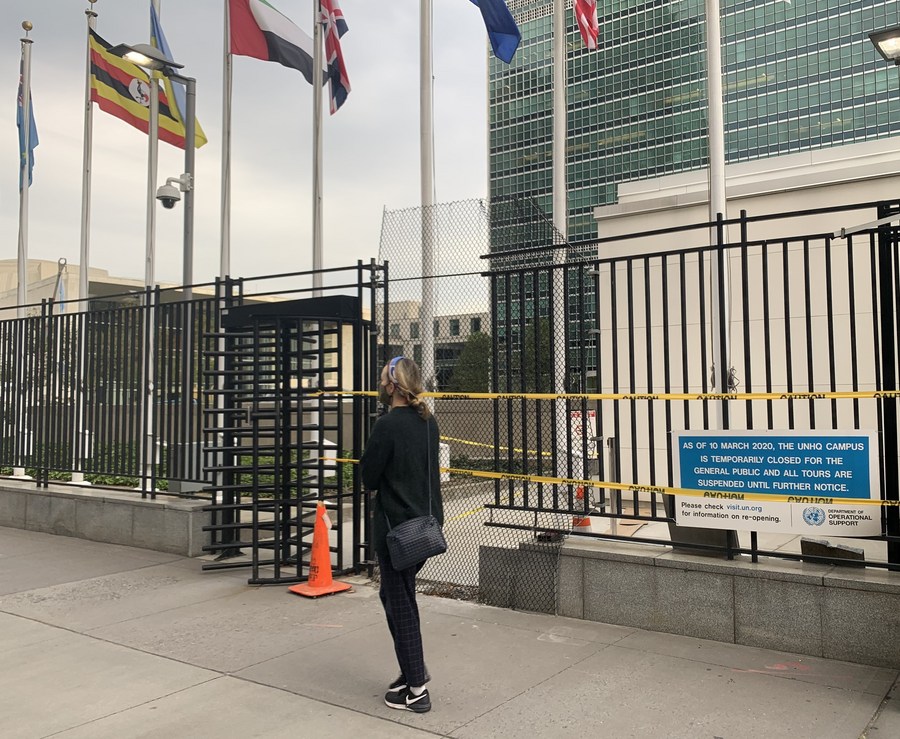UN's primacy, relevance remains unmatched since establishment: UNGA president
Video: "Peace would only be possible through the pursuit of shared goals and objectives. Thus, they set about pursuing diplomacy for peace," says President of the 75th session of the United Nations General Assembly (UNGA), Volkan Bozkir, on May 5, 2012. (Xinhua)
"At a time of deepening inequalities within and between countries, multilateral actors and partners are working tirelessly to address the multiplicity of threats facing the people we serve," says Volkan Bozkir.
UNITED NATIONS, May 5 (Xinhua) -- President of the 75th session of the United Nations General Assembly (UNGA), Volkan Bozkir, said on Wednesday that the world body remains irreplaceable since its establishment more than 75 years ago with its primacy and relevance remaining unmatched.
"The counter-factual is hard to establish - what the world might have been like without the United Nations - the conflicts not averted, the human suffering not eased. In any case, imperfect as it may be, the primacy and relevance of the United Nations remains unmatched after more than 75 years," the UNGA president, or the PGA, said in his opening remarks in the UNGA Interactive Dialogue to Commemorate and Promote the International Day of Multilateralism and Diplomacy for Peace.
"At a time of distrust and suffering in the aftermath of World War II, the founders of the United Nations demonstrated foresight in recognizing that real peace could not be achieved through the absence of conflict alone," said the PGA.
"Peace would only be possible through the pursuit of shared goals and objectives. Thus, they set about pursuing diplomacy for peace," he stressed.
Turning to the importance of the world body, the PGA recalled that during the General Debate in September last year, "more heads of state and government participated in the General Debate than ever before, proving that when the world is in crisis, leaders turn to one another here in the United Nations to promote solutions."
"Indeed, every day, I see the impact of the framework and resources of the United Nations on work in pursuit of peace, universal human rights, and sustainable development," he added.
"At a time of deepening inequalities within and between countries, multilateral actors and partners are working tirelessly to address the multiplicity of threats facing the people we serve," said Bozkir, a veteran Turkish diplomat.
"Through constructive debate and negotiations, ideas develop into norms, which in turn drive policy development and implementation, with a view to advancing the course of humanity," the PGA noted.

A woman walks by the staff entrance of the United Nations headquarters in New York, Oct. 27, 2020. (Xinhua/Wang Jiangang)
"It was in the General Assembly that the notion of universal human rights was first imagined, and it was here, in 2015, that the world pledged to leave no one behind in achieving Sustainable Development by 2030," he continued.
"For some, the first introduction of multilateralism comes at the most difficult moments in life," said the PGA.
"On the frontlines of the most challenging contexts, fractured communities recognize the blue helmets of peacekeepers as a sign that the world has not forgotten them. That the United Nations is working to support their efforts to bring about peace," he added.
The PGA said emotionally that "for people on the move, it is the shelter of a UNHCR (UN Refugee Agency) tent that allows them to sleep through the night," adding that "for those who have known hunger, it is a World Food Programme convoy that provides life-saving nourishment."
"For a child who has endured unimaginable horrors, a blue UNICEF backpack promises education, and hope for a better future," he added.
The PGA expressed the hope that "the insights shared here today" will inspire relevant people to accelerate their work "towards creating a better world for all."
The International Day of Multilateralism and Diplomacy for Peace was established on Dec. 12, 2018 through a UN resolution and was first observed on April 24, 2019.
Preserving the values of multilateralism and international cooperation, which underpin the UN Charter and the 2030 Agenda for Sustainable Development, is fundamental for promoting and supporting the three pillars of the UN - peace and security, development and human rights.
Photos
Related Stories
- UN expert decries new laws targeting racial justice protesters in U.S.
- Acute food insecurity at 5-year high in 2020 due to war, economic crisis, extreme weather: UN agencies
- UN chief welcomes Somali move to return to agreed electoral model
- Interview: China's climate goals show great courage, strong commitment, says UN climate chief
- UN General Assembly president calls for action on antimicrobial resistance
Copyright © 2021 People's Daily Online. All Rights Reserved.










